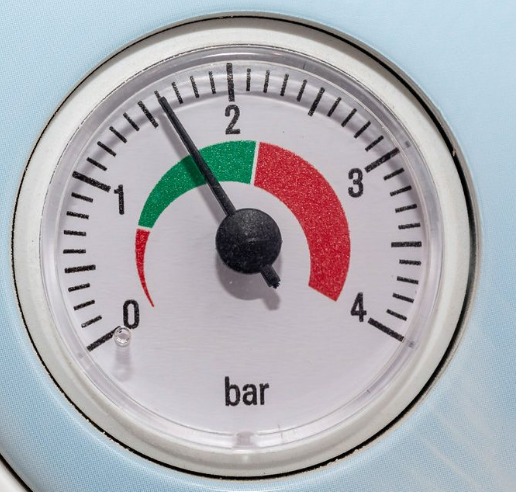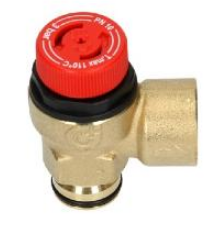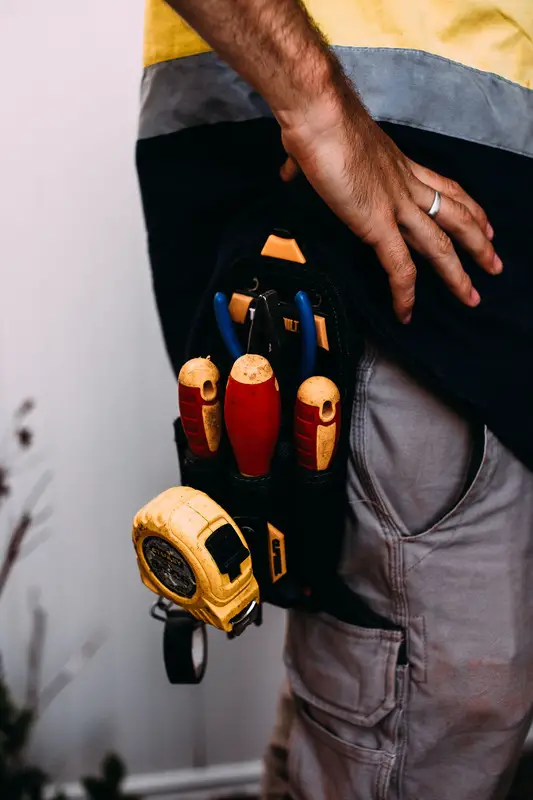In a pressurised system, steady pressure is maintained to work properly. Even when your heating system is working correctly, your boiler loses some of its pressure over time and you may need to top it up twice a year. Boilers can often lose pressure for other reasons and this causes poor performance in providing heating and hot water.
What pressure should my boiler be?
The boiler pressure reading on a healthy system is between 0.8 and 1.5 bars when the heating system is cold. The green area on the boiler pressure gauge shows you exactly what the pressure should be . If your boiler pressure keeps dropping, especially when the heating is off, and you have to top it up regularly, it would indicate a bigger problem that needs to be investigated further.
Can a boiler lose pressure without a leak?
In the vast majority of boilers that lose pressure, the cause will be a water leak, whether that is in the pipe joints, radiator valves or radiators themselves. If you have checked and found no leaks, it is likely an internal boiler leak that isn’t easily spotted. Contact a qualified engineer to investigate.

Pressure dropping on boiler every day
The most common reasons for a boiler to lose pressure are: a bigger system leak, a faulty pressure relief valve that’s been damaged by a problem with the expansion vessel, as well as radiators that have been bled but then the system not topped up after. These issues can cause a pressure loss occurring daily if not fixed in time.
Boiler pressure drops when hot water is running
If you get a pressure drop when hot water is running, this is a sign of a leak. You may not see obvious signs of a leak under the boiler, or other visible parts of the heating system. The heat exchanger within the boiler could be leaking where the water drips into the condensate pipe so you don’t see any visual signs.
With combi boilers, when water pressure drops below 0.5 bar of pressure, a pressure sensor inside the boiler detects the change and causes the boiler to switch off. This is a precautionary measure to stop the boiler from operating without adequate levels of water which can cause it to overheat.
Is low boiler pressure dangerous?
Low boiler pressure is not dangerous but will make the boiler perform poorly. As the system loses more pressure, it will put extra strain on the boiler and you will end up paying higher bills. Over time, if the cause of the low pressure is not found and fixed, the boiler will eventually stop working altogether and refuse to start.
If your boiler is causing lots of problems, take a look at the Boiler Guide to get quotes for a new boiler on the link below:

Pressure drop on boiler when heating is off causes
Water leak
This is the first and most obvious cause of a pressure drop on a system. How often the system needs to be repressurised depends on how much water is leaking. To find where a leak could be coming from, first go round each radiator to check the valves and compression fittings on it are tight and not weeping water anywhere.
If they are tight, check on ceilings for stains or damp patches. After that, you may have to take up floorboards and look under floors for leaks. If you don’t see an obvious leak, you can use a central heating leak sealer like Fernox F4 Express which finds and seals a leak in a system.
Faulty Expansion Vessel
Either it has lost charge i.e no air in it so water continues to fill the vessel without resistance, or the Schraeder valve which sits on the top or the side of the vessel, is leaking. Both these scenarios can cause a pressure drop which you may notice even when the heating is off.
Most combi boilers have the expansion vessel within the casing and you will need to call out a qualified gas engineer to take a look at it.
Pressure relief valve

When the system is on, pressure increases and if it reaches 3 bar the pressure relief valve will expel the pressure from the system by releasing water from it. If the PRV is faulty and cannot perform this action, when the system cools down you will notice a big drop on the pressure gauge.
You can tell if the PRV may be faulty by checking on the outside of the wall where the boiler is fitted, and looking for a 15mm copper pipe. When the central heating is on and you notice a drip here, it can indicate the PRV needs replacing.
Bleeding air out of radiators
If you have had to bleed air out of radiators because they weren’t getting warm, it causes the pressure to drop on your boiler gauge which you notice when the heating is off. Before turning the system back on, remember to add water back into it to raise the pressure to the correct level.
What should boiler pressure be when heating is off?
The pressure gauge on a boiler will show anywhere between 1 and 2.5 bar when the heating is turned on. The upper limit will be shown on the green zone of the pressure gauge. It is important the boiler doesn’t stay over this limit. Each manufacturer sets its own upper limit but most go up to 2.5 bar.
What happens if there is no pressure in the boiler?
If there is low or no pressure in the boiler you have lost water which it needs to work efficiently. Parts in your boiler won’t be damaged by this, but the boiler has to work harder to heat the house up and provide hot water, increasing energy bills. Your boiler may not even start up until pressure has been raised.

How to increase boiler pressure
- Turn off the boiler and wait until the radiators have cooled.
- Find the filling loop which is on the boiler pipework.
- Open both the filling loop valves to let water into the system. Valves are open when they are in line with the pipes.
- Close both the valves when the pressure gauge rises to between 1 and 1.5 bar. Do this by turning them back to their previous positions.
- Switch the boiler back on. Wait for 2 minutes while it goes through its startup sequence.
- Press the reset button if any fault code comes on the display.
- Keep an eye on the pressure gauge. Over the next hour check that the pressure doesn’t get low again. If it does, you will need to call an engineer to find and fix the fault.
